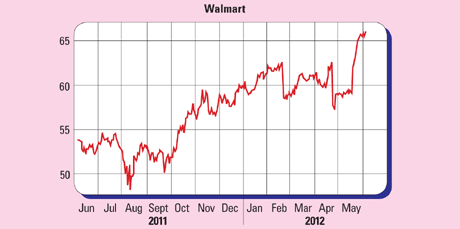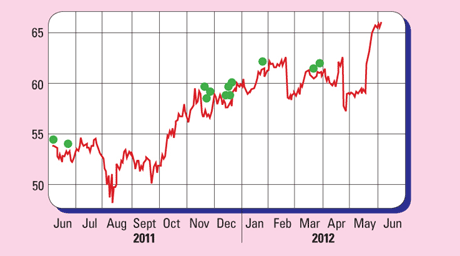Shares in focus: Walmart, the world's largest retailer
Walmart, the American supermarket giant, is embroiled in unsettling controversy. Should you buy the shares? Phil Oakley investigates.
Get the latest financial news, insights and expert analysis from our award-winning MoneyWeek team, to help you understand what really matters when it comes to your finances.
You are now subscribed
Your newsletter sign-up was successful
Want to add more newsletters?

Twice daily
MoneyWeek
Get the latest financial news, insights and expert analysis from our award-winning MoneyWeek team, to help you understand what really matters when it comes to your finances.

Four times a week
Look After My Bills
Sign up to our free money-saving newsletter, filled with the latest news and expert advice to help you find the best tips and deals for managing your bills. Start saving today!
Walmart is embroiled in unsettling controversy, but the shares are a buy, says Phil Oakley.
The business
Walmart is the world's largest retailer with annual sales of $443bn. It has more than 10,000 stores worldwide in 27 countries. America remains the biggest profit centre of the business it also includes Sam's Club, a wholesaling business used by households and small companies. Walmart serves more than 200 million customers every week and is the biggest private-sector employer in America. Its strategy is simple: to offer its customers every day low prices' on the broadest range of products. It does this by relentlessly driving down costs and becoming more efficient.
The history
Walmart is one of America's most successful companies. It began life in 1962 when Sam Walton opened its first discount store in Rogers, Arkansas. After spending most of the 1960s opening stores across Arkansas, the 1970s saw Walmart expanding across America. By the end of the decade it was operating in 11 states and had more than $1bn in sales. The 1980s saw the opening of Sam's Club wholesaling business and a retail foothold in 29 states.
MoneyWeek
Subscribe to MoneyWeek today and get your first six magazine issues absolutely FREE

Sign up to Money Morning
Don't miss the latest investment and personal finances news, market analysis, plus money-saving tips with our free twice-daily newsletter
Don't miss the latest investment and personal finances news, market analysis, plus money-saving tips with our free twice-daily newsletter
By 1990, Walmart had become America's leading retailer. In 1991, the company made its first move into international markets when it opened a supermarket in Mexico City. By 1995, the brand had a presence in all 50 US states. The late 1990s saw it make significant acquisitions in Germany and Britain, where it bought Asda.
Despite Walmart's size, sales have more than doubled during the last ten years while its returns on its investment have remained high. In recent weeks, the company has been shrouded in controversy after an article in The New York Times alleged it bribed Mexican officials in return for permission to open new stores.
The chief executive
Michael Duke has been chief executive since 2009, having previously been head of the company's international division. He joined Walmart in 1995 after 23 years in the retailing sector. He was paid $18m last year. It looks as if Duke could face a few uncomfortable months.
The allegations of bribery in Mexico and Walmart's decision not to fully investigate it happened when he was in charge of the group's international business. This has led to some media commentators speculating that he could lose his job if the allegations are found to be true.
Should you buy the shares?
When companies become as big as Walmart it's reasonable to ask whether they can keep growing. It seems that it can, but that any growth will be quite modest. After a few difficult years, the American business is winning back customers and increasing profit margins.
Mature markets such as Britain and Canada are doing well too as Walmart's low-price model is attractive to customers on tight budgets. Other international markets are expected to grow more strongly as Walmart opens more stores and continues to pursue efficiency savings.
It's not all plain sailing though. Markets such as Brazil and China have yet to produce acceptable profits, given the amount of money invested in them; more work is needed there. That said, unlike its nearest global competitors, Carrefour and Tesco, Walmart continues to grow while maintaining much higher returns on investment.
A further attraction for us is the ability of Walmart to keep growing dividends. The company's finances are in good shape and it keeps generating lots of surplus cash. This means that it should carry on buying back its own shares to boost its earnings per share. The fact that the annual dividend is covered over three times by net profits means that there is lots of room to keep boosting payments to shareholders. Although the Mexican situation is unsettling, Walmart shares look quite cheap. Buy for dividend growth.
The numbers

Stockmarket code: WMT
Share price: $66
Market cap: $223bn
Net assets (Apr 2012): $73.9bn
Net debt (Apr 2012): $46.5bn
P/e (current year estimate): 13.4 times
Yield (prospective): 2.4%
What the analysts say
Buy: 15
Hold: 18
Sell: 1
Average price target: $66.21
Directors' shareholdings

M Duke: 1,096,307
C Holley: 178,577
S Walton: 3,335,388
Get the latest financial news, insights and expert analysis from our award-winning MoneyWeek team, to help you understand what really matters when it comes to your finances.
Phil spent 13 years as an investment analyst for both stockbroking and fund management companies.
-
 Could Chinese investments race ahead in the Year of the Horse?
Could Chinese investments race ahead in the Year of the Horse?As the Year of the Horse begins, we highlight the trends and sectors that could make great Chinese investments for the coming Lunar year
-
 Can mining stocks deliver golden gains?
Can mining stocks deliver golden gains?With gold and silver prices having outperformed the stock markets last year, mining stocks can be an effective, if volatile, means of gaining exposure